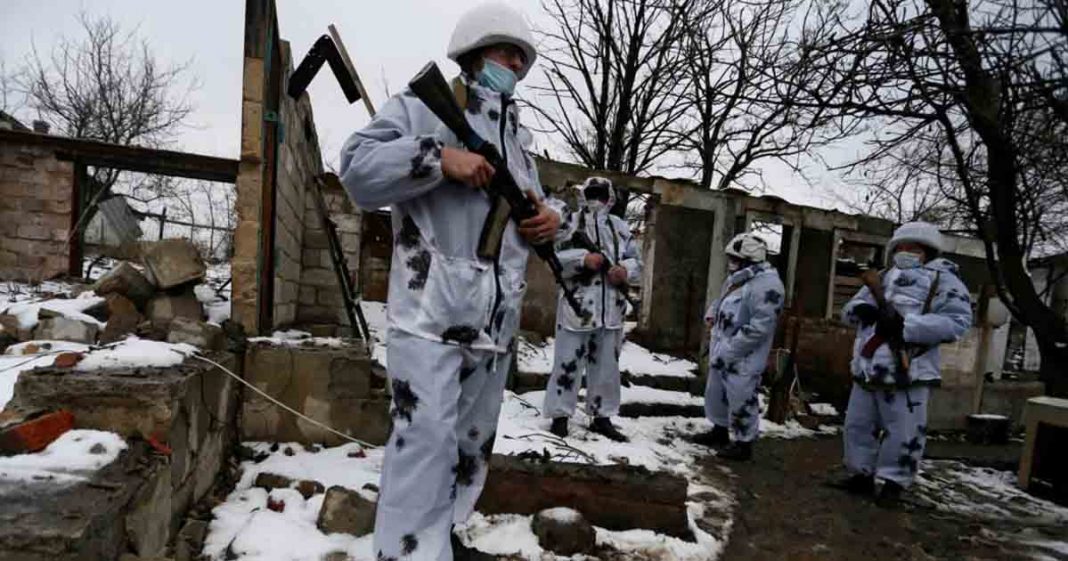Russia launched attacks on multiple cities in Ukraine on Wednesday evening. The invasion has come after months of military buildup that prompted severe criticism and dire warnings from the United States and its allies.
Loud explosions were heard in the central capital of Kyiv and the northeast city of Kharkiv minutes after Russian President Vladimir Putin said in a public address that he had authorized military action against Ukraine. Journalists in other cities also reported hearing explosions.Putin said he was taking action to “demilitarize” Ukraine because the West had pushed too far in trying to draw the country into the NATO alliance and had threatened Russian speakers in eastern Ukraine.
“I urge you to immediately lay down your weapons and go home,” Putin said, speaking to Ukrainian soldiers during a special televised address. President of Ukraine says “It is a full-scale invasion”.
Read more: Russia at the Gates: Another Sarajevo waiting to happen in Ukraine?
How may the Russian invasion unfold?
We can conjecture about the subsequent Russian military moves by referring to what the think tanks in the West had contemplated about a future war during the Cold War period. In particular, a glimpse of such a war can be gleaned from the scenario created by Sir John Hackett in his book “The Third World War: The Untold Story”.
General Sir John Winthrop Hackett (1910 –1997) was an Australian-born British Army officer, painter, university administrator, author, and in later life, a commentator.In 1966, he was appointed commander of the British Army of the Rhine and the parallel command of NATO’s Northern Army Group. In 1968 he wrote a highly controversial letter to The Times that was critical of the British government’s apparent lack of concern over the strength of NATO forces in Europe but signed the letter as a NATO officer, not as a British commander.
In 1978, he wrote a novel, The Third World War: August 1985, which was a fictionalized scenario of the Third World War based on a Red Army invasion of West Germany in 1985. It was followed in 1982 by The Third World War: The Untold Story, which elaborated on the original, including more detail from a Soviet perspective.
Read more: Saudi Arabian Army Chief visits India: Is there a hidden agenda behind this visit?
Hackett’s Scenario
In July 1985,the Soviet Union invades Yugoslavia, a U.S. Marine Corps unitintervenes. In response, the Warsaw Pact mobilizes and subsequently launches a full-scale invasion of Western Europe on 4 August 1985. Soviet forces launch a multi-pronged offensive against West Germany, Norway, and Turkey. Attacks arealso carried out using long-range strategic bombing, naval forces, and even killersatellites inspace.
However, the Soviet offensive is contained. Stiff resistance by NATO eventuallyblunts the Soviet invasion, and Warsaw Pact forces get no further westthan thetown of Krefeld (West Germany), and no further south than the Netherlands, whichtheybrieflyoccupy.
From mid-August, the capacity of the Soviet Union to wage war is significantly decreased by the political and military desertion of some of its demoralized allies, internal dissent at home, and mutinies within its forces.
Outside Europe, the Americans bomb Cuba, the Chinese invade Vietnamandoverthrow its government, Egypt invades Libya, Japan seizes the Kurile islands, the theFrontlineStates and most of the Soviet Union’so ther African allies invade South Africa, and the Soviet Navy and merchant fleet are both permanently neutralized.
In a last-ditch attempt at face-saving, the Soviets launch a nuclear missile strikeagainst Birmingham, United Kingdom.The U.S.Navy and Royal Navy retaliate with a joint nuclear strike on Minsk, which accelerates the collapseof Soviet control in its satellite states. A coup d’étatled by Ukrainian nationalists overthrows the Soviet Politburo, accelerating the end of the Soviet threat.
Shifting Facts from Fiction
Hackett’s narrative stops short of the post-nuclear exchange scenario. It presumes that the war would have ended after the joint nuclear strike by the U.S. Navy and Royal Navy on Minsk. What if the Soviet Union had not imploded after the Minsk strike, and had launched second strikes against NATO targets? This is something the NATO allies and Russia should not lose sight of during the present standoff.
Saleem Akhtar Malik is a Pakistan Army veteran who writes on national and international affairs, defense, military history, and military technology. He Tweets at @saleemakhtar53. The views expressed in this article are the author’s own and do not necessarily reflect the editorial policy of Global Village Space.













